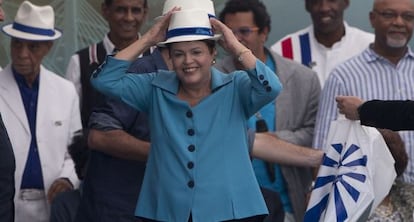“There is an inexplicable bad mood against Brazil”
President plays down importance of delays and protests just days ahead of World Cup kickoff

The government of Brazilian President Dilma Rousseff, of the Workers’ Party, has received some harsh criticism over its organization of the World Cup 2014, which is about to kick off.
Construction delays and cost overruns have been greater than those of other host nations, while street protests and citizen disaffection for the championship continue to be noticeably strong.
And yet at a dinner last Tuesday in her official residence, Palácio da Alvorada, Rousseff defended the government’s record before a group of international reporters.
The president claimed that there have been more good decisions than bad ones in the organization of the tournament, and said that Brazilians will no doubt eventually surrender to the charms of soccer.
The president claimed that there have been more good decisions than bad ones in the organization of the Cup
Rousseff also took issue with the pessimistic forecasts about the Brazilian economy that were heard at the last Davos summit, where it was claimed that emerging nations would be vulnerable to the interruption of US monetary stimulus policies.
“Where is the storm in a country with $379 billion in reserves, the fifth-largest in the world?” she asked her audience. Rousseff also noted that in 2002 this reserve pool was only $36 billion, of which $21 billion was a loan from the International Monetary Fund.
“There is an inexplicable bad mood against Brazil,” she added.
According to the president, the criticism that has rained down on the World Cup organization is due to many misunderstandings that the opposition has been quick to pounce on, such as the fact that the FIFA wanted just eight host cities, while the Lula da Silva government offered 16.
“I had dinner with Lula last night, and he didn’t want all those cities either, because he disagreed with matches being played in places with no soccer tradition,” she explained.
Where is the storm in a country with $379 billion in reserves, the fifth largest in the world?”
The criticism is unfair, Rousseff said. Out of a total $63 billion invested in infrastructure and urban mobility, only four billion are exclusively for World Cup purposes. “Everything else is for Brazil,” she said.
Asked about the fact that six out of every 10 promised construction projects never saw the light, the president retorted that “a subway line is not completed in two years.”
Rousseff, who was a minister under Lula da Silva, has led the country’s major infrastructure projects over the last few years, and she is quite aware of the national pace of construction. “An engineering project is not a clock, especially in a country with no tradition in projects,” she said.
Brazil stopped investing in large construction projects for several decades, and often there are resources that do not get sent to state and local authorities out of a lack of planning experience, she noted.
One of the issues that Rousseff seems most concerned about is tourist safety, which is falling to the army. Asked about the risk of attacks by extremist groups, the president underscored that Brazil has lived in peace for the last 150 years. Neither the young radicals of Black Blocs nor the criminal gang Primeiro Comando da Capital (PCC) seem to worry her. Neither do the street protests. “They can protest. But do not let them threaten the lives of other people or block off the streets.”
Tu suscripción se está usando en otro dispositivo
¿Quieres añadir otro usuario a tu suscripción?
Si continúas leyendo en este dispositivo, no se podrá leer en el otro.
FlechaTu suscripción se está usando en otro dispositivo y solo puedes acceder a EL PAÍS desde un dispositivo a la vez.
Si quieres compartir tu cuenta, cambia tu suscripción a la modalidad Premium, así podrás añadir otro usuario. Cada uno accederá con su propia cuenta de email, lo que os permitirá personalizar vuestra experiencia en EL PAÍS.
¿Tienes una suscripción de empresa? Accede aquí para contratar más cuentas.
En el caso de no saber quién está usando tu cuenta, te recomendamos cambiar tu contraseña aquí.
Si decides continuar compartiendo tu cuenta, este mensaje se mostrará en tu dispositivo y en el de la otra persona que está usando tu cuenta de forma indefinida, afectando a tu experiencia de lectura. Puedes consultar aquí los términos y condiciones de la suscripción digital.









































